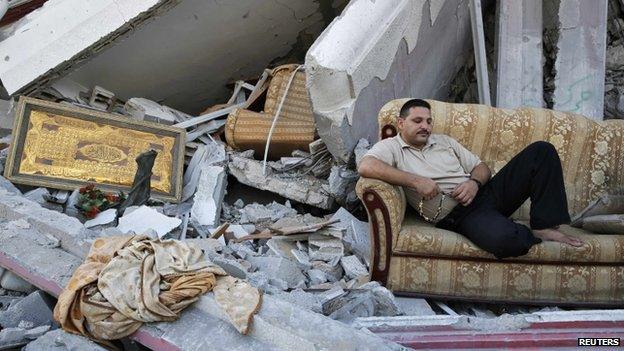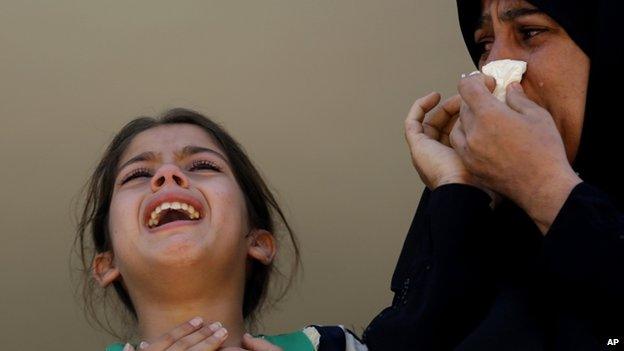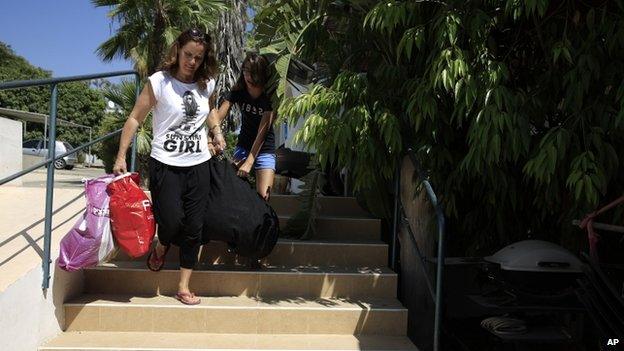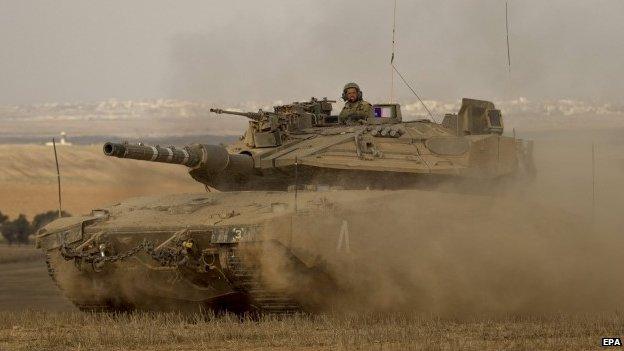Israel offers Gaza truce extension but Hamas has yet to agree
- Published
Orla Guerin speaks to people living in Gaza who say they now have nowhere to go
Israel has offered to extend a three-day ceasefire in Gaza which began on Tuesday after nearly a month of conflict, Israeli officials say.
But there has so far been no agreement from the militant Hamas movement, which controls Gaza, as indirect talks continue in Cairo.
US President Barack Obama has said a more durable truce requires risks being taken by leaders on both sides.
He said trust needs to rebuilt, which was difficult after a time of violence.
"Long term, there has to be a recognition that Gaza cannot sustain itself permanently closed off from the world," said the US president, speaking in Washington.
More than 1,800 Palestinians, mostly civilians, and 67 Israelis, mainly soldiers, have died in the conflict.
A Thai national in Israel was also killed.
Gaza's health ministry listed 1,867 people as killed. The UN says more than 1,300 were civilians, and more than 400 were children.
Lyse Doucet has gained rare access into Israel's state-of-the art radar station
In his first comments since the 72-hour truce began, Israeli Prime Minister Benjamin Netanyahu blamed Hamas for all of the civilian casualties, saying it had used civilians as human shields.
'Breaches international law'
Many Palestinians have used the ceasefire to stock up on essentials and visit homes destroyed during the Israeli air strikes, the BBC's James Reynolds in Gaza City reports.
A senior Israeli official earlier said Israel had expressed its readiness to extend the truce under its current terms beyond its expiry on Friday.
However, a member of the Palestinian delegation at the Cairo talks, Moussa Abu Marzouk, wrote on Twitter: "There is no agreement to extend the ceasefire."
The Palestinian delegation at the Cairo talks includes negotiators from Hamas, as well as members of Islamic Jihad and the Palestinian Authority.

Palestinians in Gaza City are using the temporary ceasefire to visit what is left of their neighbourhoods

More than 400 children have been killed in the recent hostilities, according to UN figures

Israelis return to their homes near the southern Gazan border after fleeing Palestinian militant rocket fire

The Israeli army says all its troops have now left the Gaza Strip
The main Palestinian demands include the end of Israel's blockade of Gaza, in place since 2007, and the opening of border crossings. The Palestinians also want internationally-funded reconstruction.
The names of those representing Israel have not been given.
Earlier, UN Secretary General Ban Ki-moon criticised Israel for shelling UN compounds, saying UN shelters must be safe zones.
"In the most recent case of shelling on a UN facility, the Israelis were informed of the coordinates 33 times," Mr Ban said. "Attacks against UN premises, along with other suspected breaches of international law, must be swiftly investigated."
Israel has been stung by widespread international criticism of its month-long bombing campaign in Gaza, says the BBC's Wyre Davies in Jerusalem.
Israel-Gaza conflict
8 July
Israeli offensive began
-
4,760+ air strikes on Gaza
3,488 rockets fired at Israel
-
1,973 people killed in Gaza
UN estimates +70% of deaths are civilians
-
3 civilians killed in Israel
64 Israeli soldiers killed
Analysis: Survivors but no winners
Gaza's health ministry listed 1,867 people as killed. The UN says more than 1,300 were civilians, and more than 400 were children.
Hundreds of thousands of displaced Palestinians in Gaza have been returning to their homes. Many have found nothing left, reports the BBC's Jon Donnison, in Gaza.
Norway is organising a donor conference to help fund Gaza's reconstruction.
Israel launched Operation Protective Edge on 8 July with the stated aim of ending rocket attacks from Gaza.
On 17 July, it began ground operations intended to destroy tunnels used by militants to infiltrate Israel.